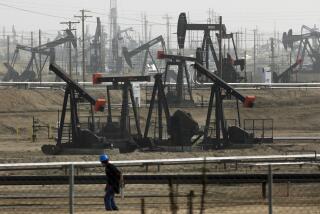Oil Firms Increase Reserve Estimates
- Share via
Boosted by acquisitions, new discoveries and expansion of existing fields, Unocal Corp. and Occidental Petroleum Corp. said Monday that they added enough new reserves of oil and natural gas last year to more than replace what they pumped out of the ground.
The announcements came the same day two smaller firms said they were cutting their reserve estimates amid increased industrywide scrutiny of how energy companies quantify their most crucial asset: the amount of oil and natural gas about to be produced and sold.
Analysts have been asking more questions about companies’ so-called proved reserves since early January, when Royal Dutch/Shell Group stunned investors by chopping its proved reserve total by about 20% of its 2002 level -- a reduction of nearly 4 billion barrels of oil and natural gas.
On Monday, El Paso Corp. said it expected to make “material negative revisions” to its tally of proved oil and gas reserves, and Canada’s Pengrowth Energy Trust announced a 9% reduction in its proved reserves.
The numbers are considered one of the most important indicators of an energy company’s health and prospects, in large part because securities rules require firms to demonstrate with “reasonable certainty” that the oil and natural gas in question is there and can be economically pumped and sold. Another key indicator is whether and how fast a company can keep adding more reserves as it depletes its existing supply.
El Segundo-based Unocal said it replaced 149% of its total worldwide production in 2003, according to preliminary estimates. In other words, the company added almost 1 1/2 barrels to its proved reserves for every barrel it produced.
Unocal finished the year with the equivalent of 1.765 billion barrels of oil in proved reserves, a slight drop from 2002 levels of 1.77 billion barrels because the company sold some producing fields during its restructuring last year.
Unocal said it increased the reserves on some projects that were producing more than expected; added other amounts because of new discoveries and expansions; and subtracted some in places where higher oil prices and production-sharing agreements have lowered the company’s share of reserves.
The company also said it would spend less money on certain Gulf of Mexico fields this year because drilling cost overruns had produced “unacceptable returns” on some projects.
Westwood-based Occidental said it replaced 184% of the oil and natural gas it produced in 2003, adding proved reserves equal to 368 million barrels of oil through new discoveries and expansions, the acquisition of some fields, upward reserve revisions and improved recovery rates on existing projects. Oxy finished 2003 with proved reserves totaling 2.47 billion barrels of oil, the company said.
Although it is common for energy companies to revise reserves up or down according to changing geological data and market conditions, several major U.S. producers have rushed to reassure investors that they calculate reserves conservatively and will not be issuing Shell-style bombshells.
Shares of Royal Dutch Petroleum Co., which owns 60% of Royal Dutch/Shell, fell almost 8% the day the reserve reduction was announced, and shares of El Paso and Pengrowth fell 3.3% and 5.1%, respectively, Monday on the New York Stock Exchange.
In announcing its 2003 reserves, Unocal stressed that it used “an extensive auditing process to assure quality reserve reporting.” The issue came up for ChevronTexaco Corp. last week during its fourth-quarter earnings call with analysts, who wanted to know whether the San Ramon, Calif., company used outside firms to validate reserve estimates.
“We do at times engage third parties to validate our reserves.... We want to get checks and balances on our own system,” said Dave O’Reilly, ChevronTexaco’s chairman and chief executive. “We have a very conservative approach.”
Nonetheless, analysts say the Shell setback has triggered renewed interest in the issue at the Securities and Exchange Commission, which has looked into oil company reserves before. ChevronTexaco, Unocal and others have said they received inquiries from the SEC in 2002 and early 2003 about how they calculate their reserves but did not make changes based on those queries.
“A lot of these companies have come out and said, ‘It’s not really an issue for us,’ but is that really true? I don’t really know,” said Severin Borenstein, director of the UC Energy Institute in Berkeley. “The reserve numbers that are put out by the companies have always been squishy.”
Unocal rose 29 cents to $37.11 on Monday and Oxy fell 25 cents to $43.80, both on the NYSE.
More to Read
Sign up for Essential California
The most important California stories and recommendations in your inbox every morning.
You may occasionally receive promotional content from the Los Angeles Times.













